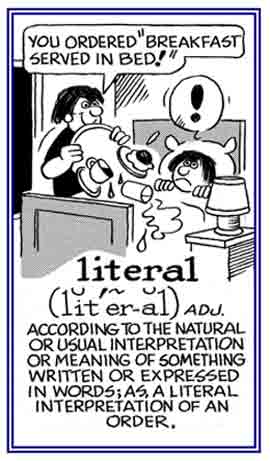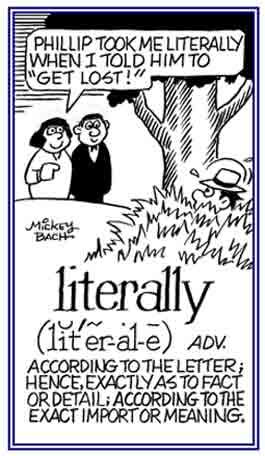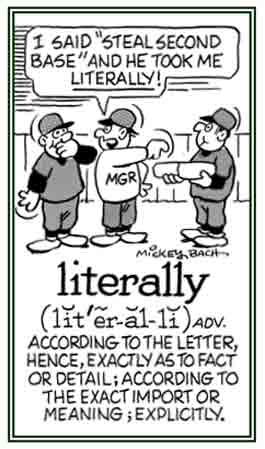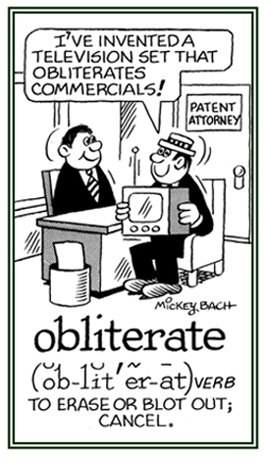liter-
(Latin: letter; a graphic symbol, a written character, an alphabetic sign)
literal (adjective), more literal, most literal
Relating to something that is exactly as stated, read or understood without any additional explanations: Samuel was told that his investment in the bank was a literal account that guarantied specific profits for each person.

© ALL rights are reserved.
Go to this Word A Day Revisited Index

Go to this Word A Day Revisited Index
so you can see more of Mickey Bach's cartoons.
1. An adherence to interpreting messages or statements in their exact and true denotation: June had a tendency towards literalism and when her sister said she should get lost, June really went out and really got lost and couldn't find her way home again!
2. The style of art that presents a compiled subject or topic as accurately as possible: Literalism can refer to the manner of artistic creation which illustrates an object or theme as precisely as can be.
2. The style of art that presents a compiled subject or topic as accurately as possible: Literalism can refer to the manner of artistic creation which illustrates an object or theme as precisely as can be.
1. Someone who strives to present the exact representation of a statement or law: Jack had to be a literalist when executing the statutes with accuracy and correctness.
2. A person who translates a text as clearly as possible: In the special language class at school, Grace learned how to be a literalist in that she worked on interpreting written work with preciseness and exactness.
2. A person who translates a text as clearly as possible: In the special language class at school, Grace learned how to be a literalist in that she worked on interpreting written work with preciseness and exactness.
literally (adverb); more literally, most literally
A description of how something completely true is stated in an emphasised way, word for word: Anne literally broke her left wrist when she slipped on the ice and fell down.

© ALL rights are reserved.

© ALL rights are reserved.
Go to this Word A Day Revisited Index


Go to this Word A Day Revisited Index
so you can see more of Mickey Bach's cartoons.
literary (adjective), more literary, most literary
1. A reference to the writing, study, or content of literature, especially of the kind valued for its quality of form: Literary words and expressions are often unusual in some way and are used to create a special effect in a piece of writing such as a poem, speech, or novel.
2. Associated with written works or other formal writings that have a significant style intended to create a particular impression: Jack used literary effects when he wanted to highlight his short story with special artistic features and attributes.
2. Associated with written works or other formal writings that have a significant style intended to create a particular impression: Jack used literary effects when he wanted to highlight his short story with special artistic features and attributes.
Something doesn't have to be "literature" to be literary, however, they are related.
literate (adjective), more literate, most literate
1. Descriptive of the ability to read and to write so others can understand what is composed: Shirley is a literate writer in English, Latin, and Ancient Greek.
2. Regarding a person who shows knowledge about particular subjects: Mark has a job which requires him to be a literate operator with computers.
2. Regarding a person who shows knowledge about particular subjects: Mark has a job which requires him to be a literate operator with computers.
1. Written works including poems, dramas, and novels which have high significance and lasting importance: Shirley is taking courses in history and English literature all of which are providing her with an appreciation for well-known authors, such as Shakespeare.
2. Books, articles, etc., about particular subjects: Such written discourses in the fields of medicine, science, and technology can also be considered to be literature.
2. Books, articles, etc., about particular subjects: Such written discourses in the fields of medicine, science, and technology can also be considered to be literature.
1. A well-educated person who is especially interested in literature and the arts: Mark and his fellow members of the book club were known to be literati because of their special interests in reading, studying, writing, and contributing to the richness of their language with their publications.
2. Etymology: from Latin literati, litterati, plural of literatus, litteratus, "lettered"; primarily, "someone who knows the letters".
2. Etymology: from Latin literati, litterati, plural of literatus, litteratus, "lettered"; primarily, "someone who knows the letters".
Examples of various kinds of literati:
a. Intellectual elite or intelligentsia
b. Persons interested in literature or the arts (first used in Italy: 1615–25)
c. People of scholarly or literary attainments
d. Academics or reviewers who critique literature
e. The educated class
obliterate (verb), obliterates; obliterated; obliterating
1. To destroy something so that nothing remains; to abolish: The fire obliterated everything, including the whole house and garage.
2. To erase or to obscure something completely, leaving no trace; to efface: Randy drank a lot of beer in order to obliterate and blot out the memories of what had happened on the weekend.
3. To wipe out, to rub off, or to erase writing or other markings; to blot out or to render undecipherable: Jeff cleaned the blackboard and obliterated all the answers to the homework that were on it before.
4. In medicine, to remove a body organ or part completely, as by surgery, disease, or radiation: After the operation on Nancy's leg, all traces of the disease were obliterated.
5. Etymology: used since about 1600, from Latin obliteratus past participle of the infinitive obliterare "to cause to disappear, to efface, to remove letters"; from ob, "against" + littera or litera, "letter, script".

© ALL rights are reserved.
Go to this Word A Day Revisited Index
2. To erase or to obscure something completely, leaving no trace; to efface: Randy drank a lot of beer in order to obliterate and blot out the memories of what had happened on the weekend.
3. To wipe out, to rub off, or to erase writing or other markings; to blot out or to render undecipherable: Jeff cleaned the blackboard and obliterated all the answers to the homework that were on it before.
4. In medicine, to remove a body organ or part completely, as by surgery, disease, or radiation: After the operation on Nancy's leg, all traces of the disease were obliterated.
5. Etymology: used since about 1600, from Latin obliteratus past participle of the infinitive obliterare "to cause to disappear, to efface, to remove letters"; from ob, "against" + littera or litera, "letter, script".
Said to be abstracted from the phrase literas scribere "to write across letters, to strike out letters".

Go to this Word A Day Revisited Index
so you can see more of Mickey Bach's cartoons.
The complete destruction of something so nothing is left: Many houses in parts of the United States have recently suffered obliteration as a result of the hurricanes that had taken place.
obliterative (adjective), more obliterative, most obliterative
1. Descriptive of the complete removal of something: The burning sun had an obliterative quality and totally faded the writing on the letter Mary had accidentally left outside on the bench and so she couldn't finish reading it!
2. A reference to the destruction of something so that it no longer exists: The hurricane had such strength and obliterative characteristics of wiping out the village near the sea that the inhabitants were evacuated within the hour.
2. A reference to the destruction of something so that it no longer exists: The hurricane had such strength and obliterative characteristics of wiping out the village near the sea that the inhabitants were evacuated within the hour.
A person who eliminates something completely so as to leave no trace of it: When Ted's house was set on fire by thieves when he was on a trip with his family, the obliterators made it appear that there would be no evidence left that they had been there and stolen his valuables.
Quotes: Illiteracy, Illiterate, Uneducated
Is there such a thing as "functional illiteracy"?: illiteracy quotes.
semiliterate (adjective), more semiliterate, most semiliterate
Descriptive of the ability to read and to write on an elementary level or to read but unable to write because of one's limited knowledge or understanding: One example of being a semiliterate person is to consistently use the wrong spelling of similar-sounding words, such as "their", "there", and "they're".
transliterate (trans LIT uh rayt", tranz LIT uh rayt") (verb), transliterates; transliterated; transliterating
To write or to spell something using the characters of a different alphabet: Tina's friend agreed to try to transliterate the ancient Egyptian script into English for her because, unless it could first be transliterated, there was no way she could understand it!


